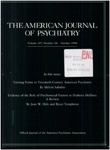Toward rational pharmacotherapy for posttraumatic stress disorder: an interim report
Abstract
There is growing evidence that medication can alleviate symptoms associated with posttraumatic stress disorder (PTSD). Recent research also suggests that PTSD has a unique biological profile consisting of alterations in sympathetic arousal, the neuroendocrine system, and the sleep/dream cycle. This profile distinguishes PTSD from both major depression and panic disorder. Medication appears to alleviate PTSD symptoms associated with sympathetic hyperarousal and intrusive recollections of the trauma but seems ineffective against avoidant symptoms. Pharmacotherapy alone is rarely sufficient to provide complete remission of PTSD. Symptom relief provided by medication facilitates the patient's participation in individual, behavioral, or group psychotherapy.
Access content
To read the fulltext, please use one of the options below to sign in or purchase access.- Personal login
- Institutional Login
- Sign in via OpenAthens
- Register for access
-
Please login/register if you wish to pair your device and check access availability.
Not a subscriber?
PsychiatryOnline subscription options offer access to the DSM-5 library, books, journals, CME, and patient resources. This all-in-one virtual library provides psychiatrists and mental health professionals with key resources for diagnosis, treatment, research, and professional development.
Need more help? PsychiatryOnline Customer Service may be reached by emailing [email protected] or by calling 800-368-5777 (in the U.S.) or 703-907-7322 (outside the U.S.).



